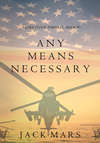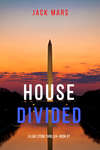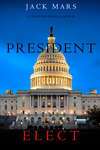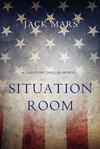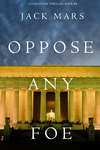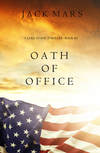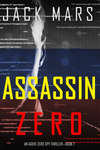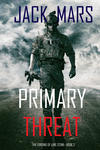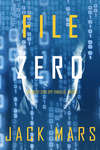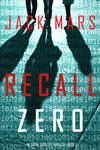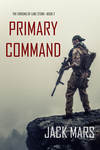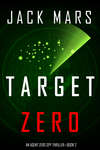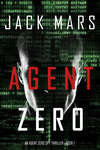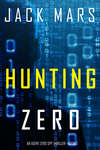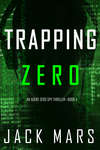Read the book: «Any Means Necessary»
Copyright © 2015 by Jack Mars. All rights reserved. Except as permitted under the U.S. Copyright Act of 1976, no part of this publication may be reproduced, distributed or transmitted in any form or by any means, or stored in a database or retrieval system, without the prior permission of the author. This ebook is licensed for your personal enjoyment only. This ebook may not be re-sold or given away to other people. If you would like to share this book with another person, please purchase an additional copy for each recipient. If you’re reading this book and did not purchase it, or it was not purchased for your use only, then please return it and purchase your own copy. Thank you for respecting the hard work of this author. This is a work of fiction. Names, characters, businesses, organizations, places, events, and incidents either are the product of the author’s imagination or are used fictionally. Any resemblance to actual persons, living or dead, is entirely coincidental. Jacket image Copyright wavebreakmedia and Michael Rosskothen, used under license from Shutterstock.com.
Jack Mars
Jack Mars is an avid reader and lifelong fan of the thriller genre. ANY MEANS NECESSARY is Jack’s debut thriller. Jack loves to hear from you, so please feel free to visit www.Jackmarsauthor.com to join the email list, receive a free book, receive free giveaways, connect on Facebook and Twitter, and stay in touch!
Part One
Chapter 1
June 5th, 1:15 a.m.
Fairfax County, Virginia – Suburbs of Washington, DC
The phone rang.
Luke Stone lay somewhere between asleep and awake. Images flashed in his mind. It was night on an empty rain-swept highway. Someone was injured. A car wreck. In the distance, an ambulance approached, moving fast. The siren wailed.
He opened his eyes. Next to him on the bed table, in the dark of their bedroom, the phone was ringing. A digital clock sat on the table next to the phone. He glanced at its red numbers.
“Jesus,” he whispered. He had been asleep for maybe half an hour.
His wife Rebecca’s voice, thick with sleep: “Don’t answer it.”
A tuft of her blonde hair poked out from under the blankets. Soft blue light filtered into the room from a nightlight in the bathroom.
He picked up the phone.
“Luke,” a voice said. The voice was deep and gruff, with the slightest hint of a Southern twang. Luke knew the voice all too well. It was Don Morris, his old boss at the Special Response Team.
Luke ran a hand through his hair. “Yeah?”
“Did I wake you?” Don said.
“What do you think?”
“I wouldn’t have called you at home. But your cell phone was off.”
Luke grunted. “That’s because I turned it off.”
“We got trouble, Luke. I need you on this one.”
“Tell me,” Luke said.
He listened as the voice spoke. Soon, he had that feeling he used to get – the feeling that his stomach was in an elevator rapidly descending fifty stories. Perhaps this was why he had quit the job. Not because of too many close calls, not because his son was growing up so fast, but because he didn’t like this feeling in his stomach.
It was the knowing that made him sick. The knowing was too much. He thought of the millions of people out there, living their happy lives, blissfully unaware of what was going on. Luke envied them their ignorance.
“When did it happen?” he said.
“We don’t know anything yet. An hour ago, maybe two. The hospital noticed the security breach about fifteen minutes ago. They have employees unaccounted for, so right now it looks like an inside job. That could change as better intel comes in. The NYPD has gone nuts, for obvious reasons. They called in two thousand extra cops, and from where I sit, it’s not going to be nearly enough. Most of them won’t even get in until the shift change.”
“Who called NYPD?” Luke said.
“The hospital.”
“Who called us?”
“The Chief of Police.”
“He call anybody else?”
“No. We’re it.”
Luke nodded.
“Okay, good. Let’s keep it that way. The cops need to lock down the crime scene and secure it. But they need to stay outside the perimeter. We don’t want them stepping on it. They also need to keep this away from the media. If the newspapers get it, it’s going to be a circus.”
“Done and done.”
Luke sighed. “Assume a two-hour head start. That’s bad. They’re way out ahead of us. They could be anywhere.”
“I know. NYPD is watching the bridges, the tunnels, the subways, the commuter rails. They’re looking at highway tollbooth data, but it’s a needle in a haystack. No one has the manpower to deal with this.”
“When are you going up there?” Luke said.
Don didn’t hesitate. “Now. And you’re coming with me.”
Luke looked at the clock again. 1:23.
“I can be at the chopper pad in half an hour.”
“I already sent a car,” Don said. “The driver just called in. He’ll be at your place in ten minutes.”
Luke placed the receiver back in its cradle.
Rebecca was half awake, her head propped up on one elbow, staring at him. Her hair was long, flowing down her shoulders. Her eyes were blue, framed in thick eyelashes. Her pretty face was thinner than when they first met in college. The intervening years had lined it with care and worry.
Luke regretted that. It burned him to think that the work he did had ever caused her pain. That was another reason why he had left the job.
He remembered how she was when they were young, always laughing, always smiling. She was carefree then. A long time had passed since he had seen that part of her. He thought that maybe this time away from work would coax it to the fore again, but progress was slow. There were flashes of the real Becca, sure, but they were fleeting.
He could tell that she didn’t trust the situation. She didn’t trust him. She was waiting for that phone call in the middle of the night, the one he would have to answer. The one where he would hang up the phone, get out of bed, and leave the house.
They’d had a good night tonight. For a few hours, it had seemed almost like old times.
Now this.
“Luke…” she began. Her scowl was not friendly. It told him this was going to be a difficult conversation.
Luke got out of bed and moved fast, partly because circumstances demanded it, partly because he wanted to leave the house before Becca organized her thoughts. He slipped into the bathroom, splashed water on his face, and glanced at himself in the mirror. He felt awake but his eyes were tired. His body looked wiry and strong – one thing all this time off had meant was he was in the gym four days a week. Thirty-nine years old, he thought. Not bad.
Inside the walk-in closet, he pulled a long steel lockbox down from a high shelf. From memory, he punched in the ten-digit combination. The lid popped open. He took out his Glock nine-millimeter and slid it into a leather shoulder holster. He crouched down and strapped a tiny.25 caliber pistol to his right calf. He strapped a five-inch serrated fold-out blade to his left calf. The handle doubled as brass knuckles.
“I thought you weren’t going to keep weapons in the house anymore.”
He glanced up and of course Becca was there, watching him. She wore a robe pulled tight around her body. Her hair was pulled back. Her arms were folded. Her face was pinched, and her eyes were alert. Gone was the sensual woman from earlier tonight. Long gone.
Luke shook his head. “I never said that.”
He stood and began to dress. He put on black cargo pants and dropped a couple extra magazines for the Glock into the pockets. He pulled on a tight dress shirt and strapped the Glock on over it. He slid steel-toed boots onto his feet. He closed the weapon box again and slid it back onto its perch near the top of the closet.
“What if Gunner found that box?”
“It’s up high, where he can’t see it and he can’t reach it. Even if he somehow got it down, it’s locked with a digital lock. Only I know the combination.”
A garment bag with two days of clothing changes hung on the rack. He grabbed it. A small bug-out bag packed with travel-size toiletries, reading glasses, a stack of energy bars, and half a dozen Dexedrine pills sat on one of the shelves. He grabbed that, too.
“Always ready, right, Luke? You’ve got your box with your guns and your bags with your clothes and your drugs and you’re just ready to go at a moment’s notice, whenever your country needs you. Am I right?”
He took a deep breath.
“I don’t know what you want me to say.”
“Why don’t you say: I’ve decided not to go. I’ve decided that my wife and son are more important than a job. I want my son to have a father. I don’t want my wife to sit up for nights on end anymore, wondering if I’m alive or dead, or if I’m ever coming back. Can you do that, please?”
At times like these, he felt the growing distance between them. He could almost see it. Becca was a tiny figure in a vast desert, dwindling toward the horizon. He wanted to bring her back to him. He wanted it desperately, but he couldn’t see how. The job was calling.
“Is Dad going away again?”
They both turned red. There was Gunner at the top of the three steps that led to his room. For a second, Luke’s breath caught in his throat at the sight of him. He looked like Christopher Robin from the Winnie the Pooh books. His blond hair poked up in tufts. He wore blue pajama pants covered with yellow moons and stars. He wore a Walking Dead T-shirt.
“Come here, monster.”
Luke put his bags down, went over, and picked up his son. The boy clung to his neck.
“You’re the monster, Dad. Not me.”
“Okay. I’m the monster.”
“Where are you going?”
“I need to go away for work. Maybe a day, maybe two. But I’ll be back as soon as I can.”
“Is Mom going to leave you like she said?”
Luke held Gunner out at arm’s length. The boy was getting big and Luke realized that one day soon he wouldn’t be able to hold him like this anymore. But that day hadn’t come yet.
“Listen to me. Mom isn’t going to leave me, and we’re all going to be together for a long, long time. Okay?”
“Okay, Dad.”
He disappeared up the steps and toward his room.
When he was gone, the two of them stared across at each other. The distance seemed smaller now. Gunner was the bridge between them.
“Luke…”
He held up his hands. “Before you speak, I want to say something. I love you, and I love Gunner, more than anything in this world. I want to be with you both, every day, now and forever. I’m not leaving because I feel like it. I don’t feel like it. I hate it. But that call tonight… people’s lives are at stake. In all the years I’ve been doing this, the times that I’ve left in the middle of the night like this? The situation was a Level Two threat exactly twice. Most of the time, it was Level Three.”
Becca’s face had softened the tiniest amount.
“What threat level is this?” she asked.
“Level One.”
Chapter 2
1:57 am
McLean, Virginia – Headquarters of the Special Response Team
“Sir?” someone said. “Sir, we’re here.”
Luke snapped awake. He sat up. They were parked at the gate of the helipad. A light rain was falling. He looked at the driver. It was a young guy with a crew cut, probably just out of the military. The kid was smiling.
“You dozed off, sir.”
“Right,” Luke said. The weight of the job settled on him again. He wanted to be home in bed with Becca, but he was here instead. He wanted to live in a world where murderers didn’t steal radioactive materials. He wanted to sleep and dream of pleasant things. At the moment, he couldn’t even imagine what those pleasant things might be. His sleep was poisoned by knowing too much.
He climbed out of the car with his bags, showed the guard his identification, and stepped through the scanner.
A sleek black helicopter, a big Bell 430, sat on the pad, rotors turning. Luke crossed the wet tarmac, ducking low. As he approached, the chopper’s engine kicked into another gear. They were ready to leave. The door to the passenger compartment slid open and Luke climbed inside.
There were six people already on board, four in the passenger cabin, two up front in the cockpit. Don Morris sat next to the closest window. The seat facing him was empty. Don gestured to it.
“Glad you could come, Luke. Have a seat. Join the party.”
Luke strapped into the bucket seat as the chopper lurched toward the sky. He looked at Don. Don was old now, his flat-top hair gone gray. The stubble of his beard was gray. Even his eyebrows were gray. But he still looked like the Delta Force commander he once was. His body was hard and his face was like a granite bluff – all rocky promontories and sharp drop-offs. His eyes were twin lasers. He held an unlit cigar in one of his stone hands. He hadn’t lit one in ten years.
As the helicopter gained altitude, Don gestured at the other people in the passenger cabin. He quickly made the introductions. “Luke, you’re at the disadvantage, because everybody here already knows who you are, but you might not know them. You do know Trudy Wellington, science and intel officer.”
Luke nodded to the pretty young woman with the dark hair and the big round glasses. He had worked with her many times. “Hi, Trudy.”
“Hi, Luke.”
“Okay, lovebirds, that’s enough. Luke, over here is Mark Swann, our tech officer on this job. And with him is Ed Newsam, weapons and tactics.”
Luke nodded to the men. Swann was a white guy, sandy hair and glasses, could be thirty-five, could be forty. Luke had met him once or twice before. Newsam was a black guy Luke had never seen, probably early-thirties, bald, close-cropped beard, stacked and chiseled, broad chest, tattooed twenty-four-inch pythons bulging from a white T-shirt. He looked like he’d be hell in a gunfight, and even worse in a street fight. When Don said “weapons and tactics,” what he meant was “muscle.”
The helicopter had reached cruising altitude; Luke guessed about ten thousand feet. It leveled off and started moving. These things tapped out at about 150 miles per hour. At that speed, they were looking at a solid hour and a half to New York City.
“Okay, Trudy,” Don said. “What do you got for us?”
The smartpad in her hands glowed in the darkness of the cabin. She stared into it. It gave her face an eerie quality, like a demon.
“I’m going to assume no prior knowledge,” she said.
“Fair enough.”
She began. “Less than an hour ago, we were contacted by the New York Police Department counter-terrorism unit. There is a large hospital on the upper east side of Manhattan called Center Medical Center. They store a great deal of radioactive materials onsite, in a containment vault six stories below street level. Mostly, the materials are waste products from radiation therapy for cancer patients, but they also stem from other uses, including radiographic imaging. Sometime in the last few hours, unknown persons infiltrated the hospital, breached the security system, and removed the radioactive waste housed there.”
“Do we know how much they got?” Luke said.
Trudy consulted her pad. “Every four weeks, the materials are removed by truck and are transported to a radioactive containment facility in western Pennsylvania jointly controlled by the Department of Homeland Security and the Pennsylvania Department of Environmental Protection. The next delivery was scheduled for two days from now.”
“So about twenty-six days of radioactive waste,” Don said. “How much is that?”
“The hospital doesn’t know,” Trudy said.
“They don’t know?”
“They inventory the waste and track it in a database. The database was accessed and erased by whoever stole the material. The amounts differ from month to month, based on treatment schedules. They can recreate the inventory from treatment records, but it’s going to take several hours.”
“They don’t back up that database?” said Swann, the tech guy.
“They do back it up, but the backup was also wiped clean. In fact, records for the past year were wiped.”
“So someone knows what they’re doing,” Swann said.
Luke spoke up. “How do we know this is an emergency if we don’t even know what was taken?”
“Several reasons,” Trudy said. “This was more than a theft. It was a well-coordinated and planned attack. The video surveillance cameras in strategic parts of the hospital were turned off. This includes several entrances and exits, stairwells and freight elevators, the containment vault, and the parking garage.”
“Did anyone talk to the security guards?” Luke said.
“The two security guards who manned the video console were both found dead inside a locked equipment closet. They were Nathan Gold, fifty-seven-year-old white male, divorced, three children, no known ties to organized crime or extremist organizations. Also Kitty Faulkner, thirty-three-year-old black female, unmarried, one child, no known ties to organized crime or extremist organizations. Gold worked at the hospital for twenty-three years. Faulkner worked there eight years. The corpses were undressed, their uniforms missing. They were both strangled, with obvious facial discoloration, swelling, neck trauma, and ligature marks associated with death by garroting or similar technique. I have photos if you want to take a look.”
Luke held up a hand. “That’s okay. But let’s assume for the moment that it was men who did this. Does a man kill a female security guard and then put on her uniform?”
“Faulkner was tall for a woman,” Trudy said. “She was five foot ten, and heavyset. A man could easily fit into her uniform.”
“Is that all we have?”
Trudy went on. “No. There’s a hospital employee who was on shift and is currently unaccounted for. That employee is a custodial staff member named Ken Bryant. He’s a twenty-nine-year-old black male who spent a year in pre-trial detention on Rikers Island, and then thirty months at Clinton Correctional Center in Dannemora, New York. He was convicted of robbery and simple assault. Upon release, he completed a six-month jail diversion and job training course. He’s worked at the hospital for nearly four years, and has a good record. No attendance issues, no disciplinary issues.
“As a custodian, he has access to the hazardous waste containment vault, and may have knowledge of hospital security practices and personnel. He once had ties to drug traffickers and to an African-American prison gang called the Black Gangster Family. The drug traffickers were low-level street dealers in the neighborhood where he grew up. He probably affiliated himself with the prison gang for personal protection.”
“You think a prison gang, or a street gang, was behind this?”
She shook her head. “Absolutely not. I mention Bryant’s affiliations because he’s still a loose end. To access and erase a database, as well as hijack a video surveillance system, requires technical expertise not generally associated with street or prison gangs. We’re thinking the level of sophistication and the materials stolen suggest a terrorist sleeper cell.”
“What can they do with the chemicals?” Don said.
“It has radiological dispersion device written all over it,” Trudy said.
“Dirty bomb,” Luke said.
“Bingo. There’s no other reason to steal radioactive waste. The hospital doesn’t know the amounts that were taken, but they know what the stuff was. The chemicals include quantities of iridium-192, caesium-137, tritium, and fluorine. Iridium is highly radioactive, and concentrated exposure can cause burns and radiation sickness within minutes or hours. Experiments have shown that a tiny dose of caesium-137 will kill a forty-pound dog within three weeks. Fluorine is a caustic gas dangerous to soft tissue like the eyes, skin, and lungs. At very low concentrations, it makes eyes water. At very high concentrations, it inflicts massive lung damage, causing respiratory arrest and death within minutes.”
“Wonderful,” Don said.
“The important takeaway here,” Trudy said, “is high concentrations. If you’re a terrorist, for this to work, you don’t want a wide dispersal area. That would limit exposure. You want to pack a bomb with the radioactive material and a conventional explosive like dynamite, and you want to set it off in an enclosed space, preferably with a lot of people around. A crowded subway train or subway station at rush hour. Commuter hubs like Grand Central Terminal or Penn Station. A large bus terminal or airport. A tourist attraction like the Statue of Liberty. The enclosed space maximizes radiation concentrations.”
Luke pictured the narrow, claustrophobic stairwell that climbed to the top of the Statue of Liberty. On any given day, it was mobbed with people, often school children on field trips. In his mind’s eye he saw Liberty Island filled with ten thousand tourists, the ferries jammed with even more people, like refugee boats from Haiti.
Then he saw the subway platforms of Grand Central Terminal at 7:30 a.m., so crowded with commuters that there was nowhere to stand. A hundred people would be lined up on the stairs, waiting for a train to come in and the platform to clear so the next group of people could descend. He pictured a bomb going off amongst that crowd.
And then the lights going out.
A wave of revulsion passed through him. More people would die in the panic, in the crush of bodies, than in the initial explosion.
Trudy went on. “The problem we face is there are too many attractive targets to watch them all, and the attack doesn’t have to take place in New York. If the theft happened as long as three hours ago, then we’re already looking at a possible operations radius of at least a hundred fifty miles. That includes all of New York City and its suburbs, Philadelphia, and major cities in New Jersey like Newark, Jersey City, and Trenton. If the thieves remain at large for another hour, you can expand that radius to include Boston and Baltimore. The whole region is a population center. In a radius that large, we could be looking at as many as ten thousand possible soft targets. Even if they stick with high-profile, big-name targets, we’re still talking about hundreds of places.”
“Okay, Trudy,” Luke said. “You gave us the facts. Now what’s your gut?”
Trudy shrugged. “I think we can assume this is a dirty bomb attack, and that it’s sponsored by a foreign country, or possibly an independent terrorist group like ISIS or Al-Qaeda. There may be Americans or Canadians involved, but operational control is elsewhere. It’s definitely not a homegrown domestic group, like environmentalists or white supremacists.”
“Why? Why not domestic?” Luke said. He already knew why, but it was important to air it, to take things one step at a time, to not overlook anything.
“The leftists burn down Hummer dealerships in the middle of the night. They spike logging forests, and then paint the spiked trees so no one gets hurt. They have zero history of attacking populated areas or murdering anyone, and they hate radioactivity. The right-wingers are more violent, and Oklahoma City demonstrated they will attack civilian populations as well as symbols of government. But neither group likely has the training for this. And there’s another good reason why it probably isn’t them.”
“Which is?” Luke said.
“Iridium has a very short half-life,” Trudy said. “It’ll be mostly useless in a couple of days. Also, whoever stole these chemicals needs to act fast before they get radiation sickness themselves. The Muslim holy month of Ramadan begins tonight at sunset. So I think we have an attack designed to coincide with the start of Ramadan.”
Luke nearly breathed a sigh of relief. He had known and worked with Trudy for a few years. Her intel was always good, and her ability to spin scenarios was exceptional. She was right far more often than she was wrong.
He looked at his watch. It was 3:15. Sunset was probably around eight o’clock tonight. He did a quick calculation in his head. “So you think we have more than sixteen hours to track these people down?”
Sixteen hours. Looking for a needle in a haystack was one thing. But having sixteen hours to do it, with the most advanced technology and the very best people, was quite another. It was almost too much to hope for.
Trudy shook her head. “No. The problem with Ramadan is it starts at sunset, but whose sunset? In Tehran, sunset tonight will be at 8:24 p.m., which is 10:54 a.m. here. But what if they pick the start of Ramadan worldwide, for example in Malaysia or Indonesia? We could be looking at something as early as 7:24 a.m., which makes some sense because that’s the start of the morning rush hour.”
Luke grunted. He stared out the window at the vast lighted megalopolis below him. He glanced at his watch again. 3:20. Up ahead, on the horizon, he could see the tall buildings of Lower Manhattan, and the twin blue lights cutting high into the sky where the World Trade Center once stood. In three hours, the subways and train stations would begin filling up with commuters.
And out there, somewhere, were people planning to make those commuters die.
